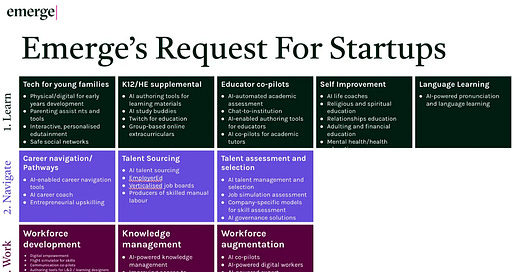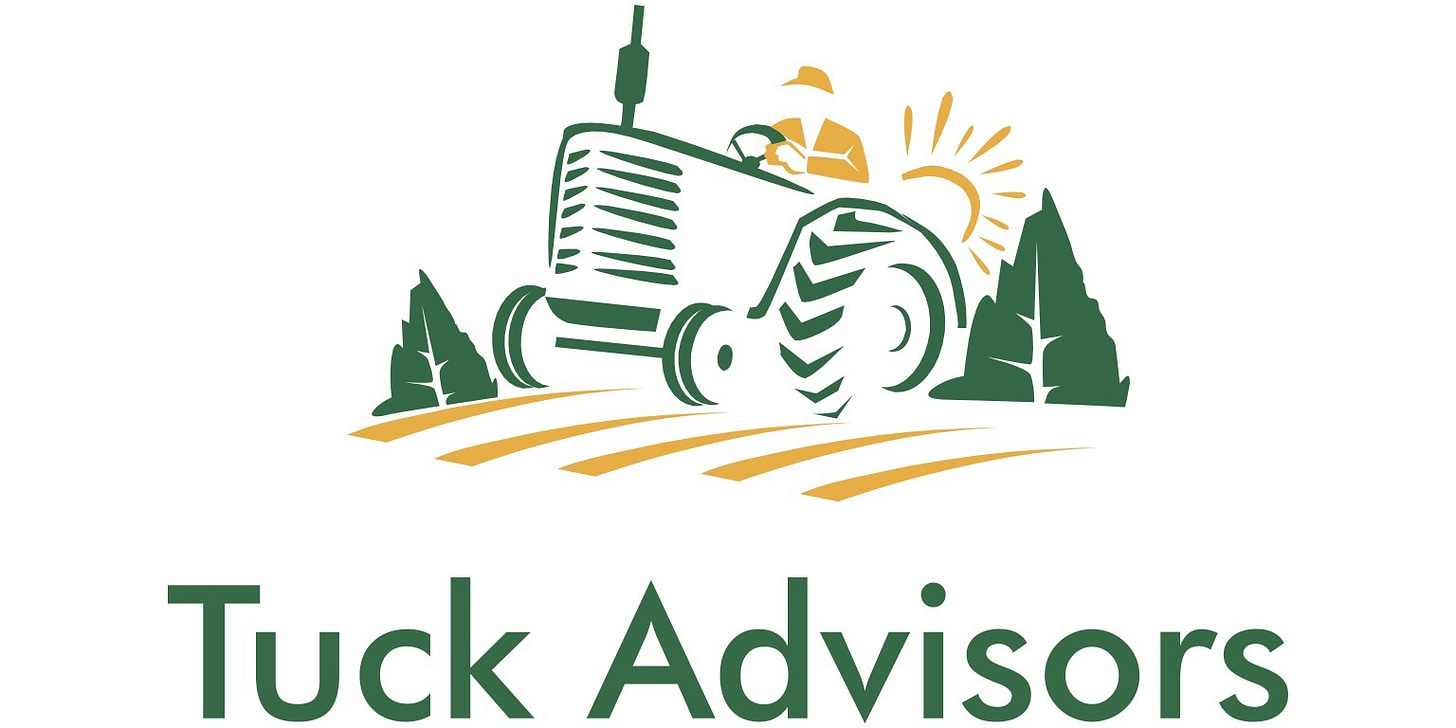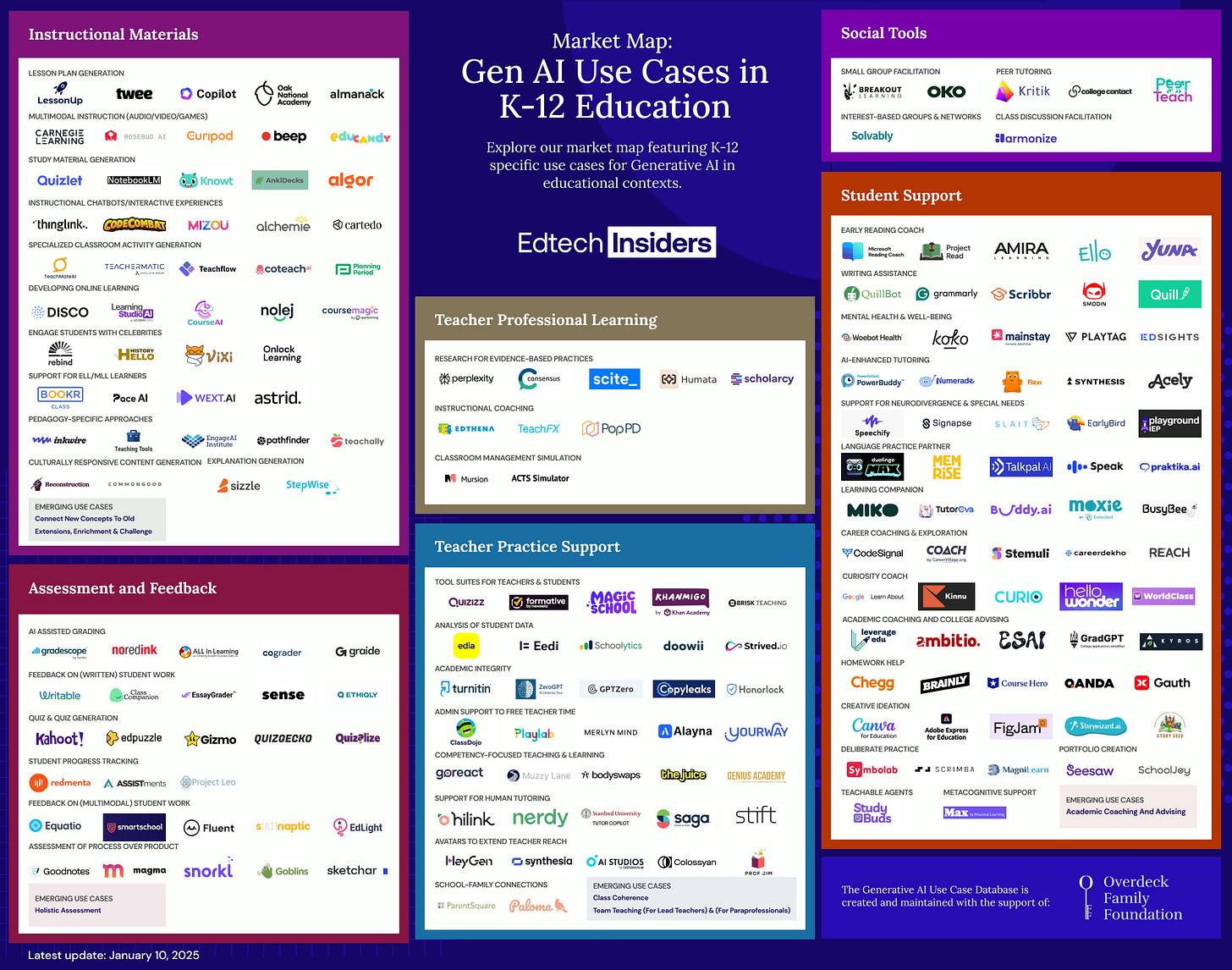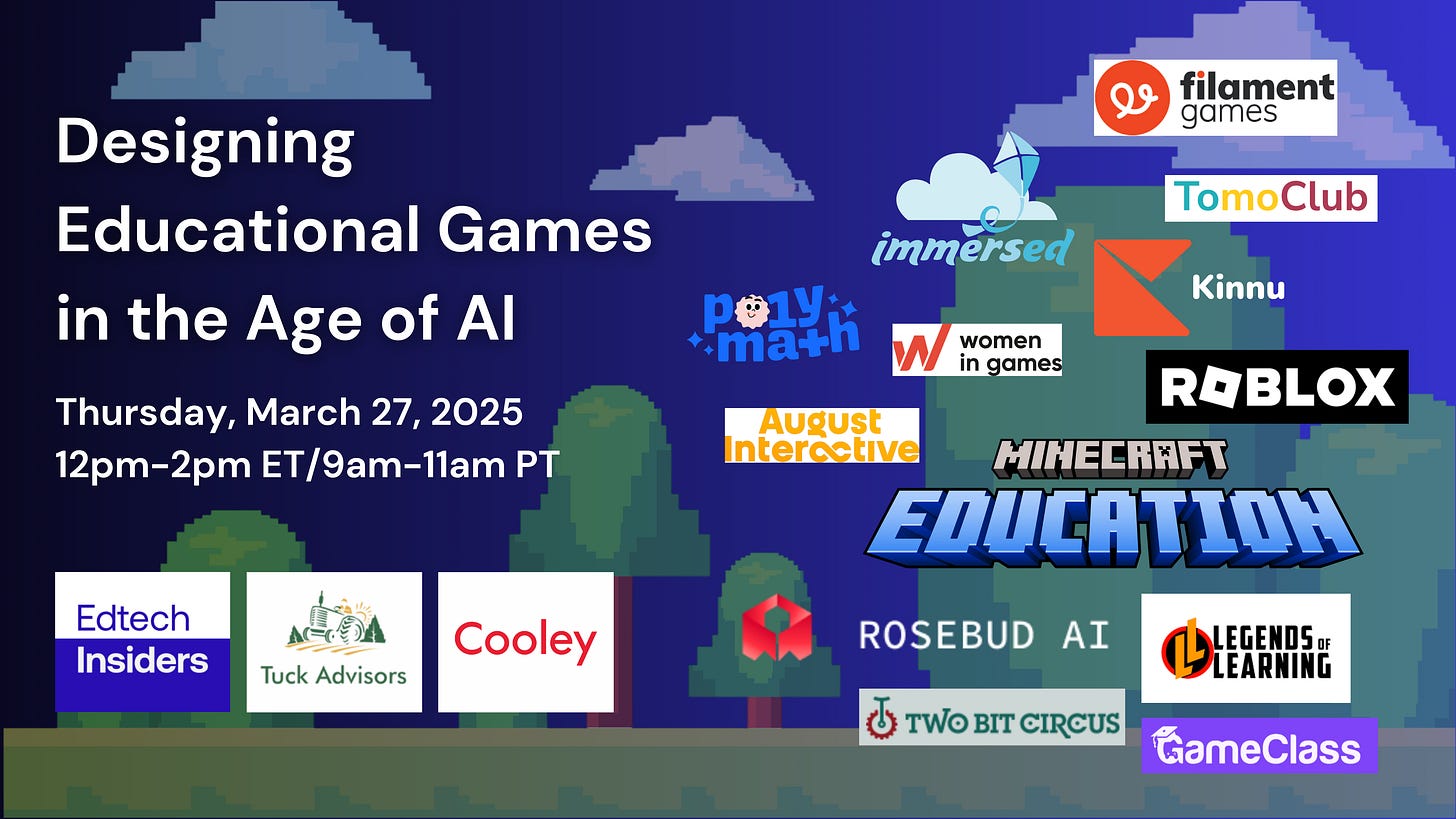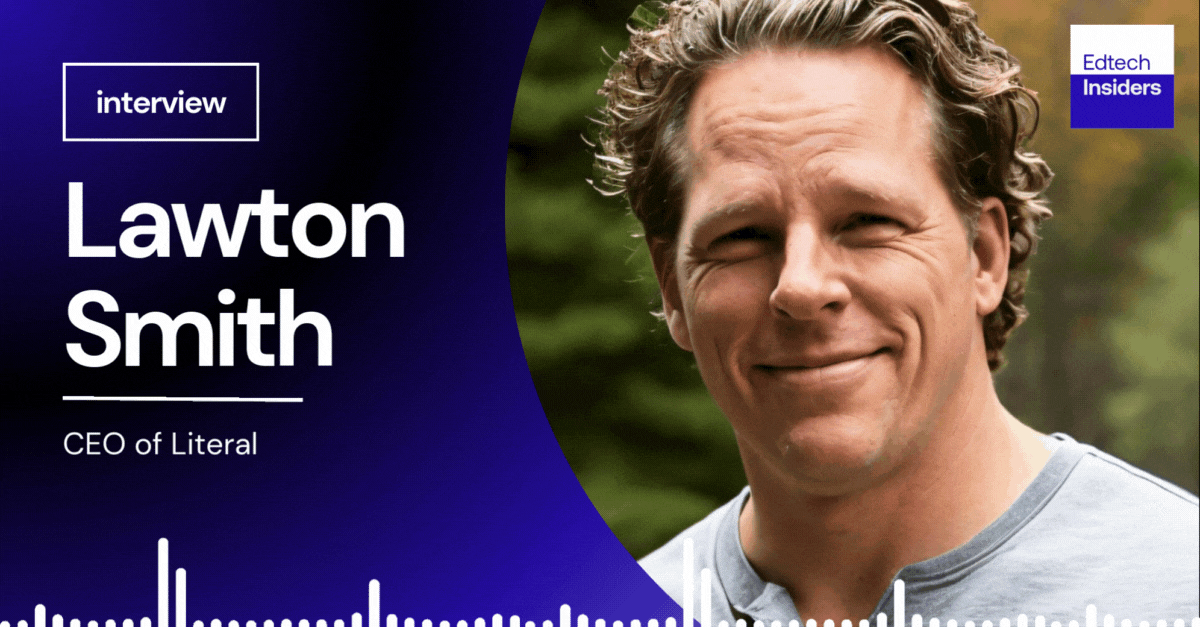41 Startup Ideas Blueprinting the Future of Learning and Work
Inside Emerge Capital's Manifesto for an AI-Enabled Post-Automation World
Hello Edtech Insiders family, Ben Kornell here!
I have a quick update to share: I’ve got a new gig! I’m joining the Art of Problem Solving as CEO. You can read the press release here. Please reach out if you want to help raise the ceiling on math education for K12 kids.
As for Edtech Insiders, I will still be partnering with Alex to deliver on our mission to connect and catalyze the edtech community! That said, there is a lot of work that our behind-the-scenes team puts in to produce the best podcasts, newsletters, and events possible. We could use your help. Please consider supporting Edtech Insiders by becoming a member-subscriber or a company sponsor today. Every dollar goes directly to support our content and community!
Thank you all for your support and without further ado… on to the newsletter!
41 Startup Ideas Blueprinting the Future of Learning and Work
By: Jan Lynn-Matern
Emerge is a $73m pre-seed fund backed by 100+ of the world’s best future of work and learning operators. AI is fundamentally reshaping how we learn, find and do our jobs – our vision is to democratise access to opportunity by being a catalytic partner for early-stage founders focused on this seismic shift.
We were the first specialist future of work and learning investors in Europe. Over the past decade, we have made 80+ investments in companies now valued at over $2b and impacting more than 31M people worldwide.
The reason we do what we do is because we got lucky. We’re the kids of immigrants, refugees and working-class parents, and we were lucky to receive world-class education and training that gave us access to career opportunities our parents could only dream of. Now we are on a mission to support the most important transition the world will see this century.
Will robots steal our jobs? The short answer is: yes, they might. But, if we can adapt, we’ll get better ones.
AI is changing everything — it’s a general purpose technology, so it affects every aspect of how we live, learn, and work. Some parts of our jobs will be automated, some augmented, and the rest will be performed by people who can work most effectively alongside AI. These changes are bigger than anything we’ve seen since the Industrial Revolution.
At the same time, AI will add more to global GDP by 2030 than the current output of the United Kingdom. That growth will create plenty of good jobs (up to 50 million), many of which will be in new types of occupations that haven’t even existed before.
It’s a fact that if you don’t adapt to this new world, you will be left behind — and what worries us at Emerge is that people don’t have access to the tools, skills, and confidence they need to do so.
A few months ago, we launched our new manifesto. This sets out the three categories – Learn, Navigate, and Work – and 41 specific startup ideas we believe will define the future of work and learning.
Where did these come from? We analyzed more than 22,000 future of work and learning funding rounds worldwide, involving more than 8,000 unique companies. We used AI to enrich and classify this data, learning more about these companies and what they were doing. The 41 startup ideas that emerged were validated by our community of 100+ Venture Partners – entrepreneurs and executives who have built some of the most successful consumer learning products worldwide.
Thanks to our friends at Edtech Insiders, we’re excited to take you through these market categories and startup ideas we believe will define the future. If you know a founder who’s building a company transforming the future of work or learning, please get in touch! The easiest way to do so is to send us your deck via our simple Typeform, here.
Without further ado, here’s 41 startup ideas we believe will define the future of work and learning within 3 categories: Learning, Navigating Careers, and Work.
Startup Ideas for the Future of Learning
To be adaptable, you need to start with strong interdisciplinary knowledge and be able to learn new things constantly and fast. That’s simply not what’s available to most people on the planet. Why? Access to education varies widely across all dimensions—relevance, cost, and quality.
Using the power of AI, startup ideas that fall into our “Learn” segment catalyse huge improvements in education at all levels by making personalised learning accessible to every learner at near-zero marginal cost, across the following market categories for young and adult learners:
Tech for Young Families
Intersection of the $57B educational toys market [source] and the $250B global early years education market [source].
Physical/Digital for Early Years Development: Services that combine physical and digital experiences to engage the child/family and build lasting habits. Examples: Yoto, Edurino.
Interactive, Personalised Edutainment: Interactive and personalised learning experiences, from literacy to numeracy to edutainment.
AI Parenting Assistants and Tools: Personalised and affordable assistance for parents that builds confidence and reduces stress at home.
Safe Social Networks: Alternative digital environments for kids that allow safe interaction with content and friends
Higher Education and K12 B2C Supplemental Tools
Intersection of the $14B study tools market [source] and $10B online tutoring market [source].
AI Authoring Tools for Learning Materials: Tools that give learners content creation superpowers, enabling them to transform textbooks, lectures and notes into personalised and interactive learning materials such as mind maps, flash cards, presentations, and more. Example: Algor.
AI Study Buddies: Tools that increase access to personalised study help by mimicking the actions of a good tutor, distributed either directly to consumers or via schools and publishers. Examples: Solvely, Foondamate.
Twitch for Education: Live interactive lessons from big brand teachers/schools. Example: MyEdSpace.
Group-Based Online Extracurriculars: Democratising access to extracurriculars through group-based online delivery.
Educator Tools and Co-Pilots
There is a $6B teacher professional development market in the US alone [source], while the teacher training market is expected to reach almost $33B by 2028 [source], as the world needs to add more than 7M teachers a year on average [source].
AI-Automated Academic Assessment: Tools that automate the evaluation of academic assessments, saving institutions significant time and money. Example: Cadmus.
Chat-to-Institution: AI chatbots that allow students to speak to their university’s HRIS, LMS and customer/student support function 24/7. Example: Learnwise.
AI-Enabled Authoring Tools for Educators: Tools that radically speed up the process of creating high quality learning and classroom materials for educators. Example: Algor.
AI Co-Pilots for Academic Tutors: Infrastructure tools for tutors and/or tutoring agencies that help them scale high quality tutoring delivery.
Self Improvement
Intersection of the $44B personal development market [source] and the $3.2B online life coaching market [source].
AI Life Coaches: AI-powered tools that dramatically reduce the cost of delivering high-quality life/career/relationship coaching.
Spiritual Education: Hyper-personalised learning and coaching experiences that help people connect with their spiritual selves and find meaning. Example: Niyyah.
Relationships Education: Hyper-personalised learning and coaching experiences that help us build and maintain strong romantic relationships and friendships. Example: Kuddl.
Adulting and Financial Education: Tools that enable users to learn about and better manage their finances.
Health Education: Tools that create healthy habits and skills to improve mental and physical health (e.g. socio-emotional, sleep, nutrition) before these issues become bigger problems.
Language Learning
The $21B global digital language learning market [source].
AI-Powered Pronunciation and Language Learning: Solutions that enable language learners to practise speaking — by far the most desirable language-related skill — with an AI avatar at near zero marginal cost.
Startup Ideas for the Future of Career Navigation
Given AI's disruptive nature, our jobs and roles will change much more frequently in the future. Already, we are experiencing twice the pace of occupational transitions as before the pandemic. Workers need to improve their knowledge of when to switch jobs or careers, where to go next, and how to get there.
In parallel, organisations will need to constantly reinvent themselves to keep pace with changes in technology and society, creating a massive talent management challenge: who to hire, who to develop and how, and which roles to cut.
Companies in our “Navigate” segment work with both employers and candidates, using AI to improve the efficiency and quality of some of life’s most important decisions: who we work with.
Career Navigation and Career Pathways
The $14.5B career counselling market [source], augmented by a $1.7B outplacement services market [source].
AI-Enabled Career Navigation Tools: Tools that accurately match end users with career paths and roles, based on a deep understanding of skills, personality and macro factors. Example: FutureFit.
AI Career Coaches: Tools that level the playing field and allow candidates to represent themselves best during the hiring process.
Entrepreneurial Upskilling: Resources, communities and guidance focused on a massively underserved segment: small business owners and creators. Example: Prentice.
Talent Sourcing
The $141B talent acquisition and staffing technology and services market [source].
AI Talent Sourcing: Tools that save recruiters time by automating the search for and connection with potential talent, and managing the employer brand.
EmployerEd: Generating candidate pipeline through some form of job simulation, e.g. Employer-tech-stack-linked bootcamps; Digital mini-internships; Employer-branded talent academies. Example: Academy.
Verticalized Job Boards: Nextgen job boards that are sector-specific and own more of the value chain, including vetting candidates and supporting better matches.
Producers of Skilled Manual Labour: Bootcamps, migration solutions, and staffing providers that increase the net supply of manual skilled labour and connect it with high-value jobs. Example: Varm.
Talent Assessment and Selection
The $22B talent assessment market [source].
AI Talent Management and Selection: Tools that enable recruiters to interact with talent at scale and make more accurate hiring decisions, including chatbots, automated interviews, interview co-pilots and automatic candidate assessment. Example. Popp.
Job Simulation Assessment: Assessing candidates based on customised work sample tests, graded fairly by AI, to enable hiring based on a person’s true skills and potential, not their CV. Example: Skillstrust.
Company-Specific Models for Skill Assessment: Connecting all of a company’s performance, goal management, and career development data to build a company-specific model that can power other use cases like hiring, performance coaching/feedback and career progression.
AI Governance Solutions: Tools that enable HR to monitor the use of AI models throughout the HR function to prevent biased decision-making.
Startup Ideas for the Future of Work
The future is defined by an increasing social divide between those who can use AI to increase their productivity and those who try to compete against it. Today, most of AI’s benefits accrue to technology companies and the few people working for them. Making AI's power accessible to everyone is one of the biggest opportunities of our time.
Companies in our “Work” segment empower individuals by building easy-to-use tools that enable people in all professions to collaborate with AI and to do more with less — and empower organisations to fuse work and learning to allow for constant transformation and upskilling. This will eliminate repetitive, dull work and free people to spend time on high-value tasks like innovation, decision-making and managing risk.
Workforce Development
Intersection of the $396B corporate training market and $46B online degrees and micro-credentials market [source].
Digital Empowerment: Tools to upskill and enable professionals to use AI, no-code and RPA, and to get the most out of sophisticated software. Example: Mendo.
Flight Simulator for Interpersonal Skills: Interactive learning experiences that create safe environments in which to train for high-stakes situations or complex interpersonal skills, such as sales, leadership and negotiation — from voice to avatars to XR. Example: Replicate.
Business Communication Co-Pilots: AI that improves business communication skills through feedback and automation, including both written and verbal work outputs, from emails to business calls to proposals.
Authoring Tools for L&D and Learning Designers: Innovative authoring tools that turn boring L&D content into interactive avatars, AI tutors or even facilitator-less group activities. Examples: Sparkwise, Engageli, Colossyan.
Low-Cost Performance Coaching/Mentoring: Platforms that radically decrease the cost of delivering coaching/mentoring to employees at all levels of the corporate pyramid, such as using trainee coaches, p2p coaches or AI.
Frontline Worker Management Tools: Shopfloor-level management systems that are used by frontline workers 24/7 to track tasks, competencies, development, safety compliance and more, leading to greater productivity, transparency and development opportunities.
Workforce Augmentation and Knowledge Management
The $558B knowledge management market [source].
AI-Powered Knowledge Management: The average knowledge worker uses 40–60 different apps. Knowledge management tools designed for the enterprise allow users to query disparate information silos through a single interface. Examples include both horizontal and verticalized solutions (e.g. Causaly).
Improving Access to Academic Knowledge: Processes and tools that make academic research more accessible and approachable.
AI-Powered Second Brain: End-user focused tools for frictionless capture and categorisation of ideas, actions and new information, allowing for just-in-time retrieval.
AI Co-Pilots: Vertically specialised AI systems that augment skilled human labour to streamline repetitive workflows.
AI-Powered Digital Workers: Automated digital workers trained on your company’s data that execute repetitive tasks, e.g. in SDR or recruiting roles.
AI-Powered Expert Marketplaces: The next generation of expert marketplaces, using AI to improve the speed/quality of matches as well as the acquisition and evaluation of experts.
Curious to Learn More? Let’s Connect!
Want to get in touch with the Emerge team? Here are some ways to connect further:
Send Your Deck: If you want to change the world of work or learning, no idea is too early for us. Get in touch with us at this link.
Portfolio Careers: if you’re looking for roles in the world’s best future of work and learning companies, look no further. Search our portfolio companies’ job board here: careers.emergecapital.vc/companies.
Newsletter: Sign up to our newsletter and receive best in class tactical insights, market deep dives and invites to our special events — once a month, straight to your inbox. Sign up here.
Further Resources: Read deep dives into all these startup ideas and market categories, alongside other sector-leading research, at Emerge Insights.
This edition of the Edtech Insiders Newsletter is sponsored by Tuck Advisors.
Since 2017, Tuck Advisors has been a trusted name in Education M&A. Run by serial entrepreneurs with over 25 years of experience in founding, investing in, and selling companies, we believe you deserve M&A advisors who work as hard as you do. Tuck Advisors is offering an exclusive opportunity to acquire a premium portfolio of 314 education-focused web domains with strong SEO, brand authority, and monetization potential. Contact us to learn more.
Have questions or ready to discuss M&A? Reach out to us.
Join Edtech Insiders+
If you love Edtech Insiders and want to continue to support our work, consider becoming a paid subscriber! By joining Edtech Insiders+ you receive:
Early access to all Edtech Insiders events. No more sprinting to sign up for our monthly happy hours, edtech summits, and online conferences.
Access to our exclusive WhatsApp channel to connect with the Edtech Insiders community and discuss the latest trends and news in our space.
Access to exclusive member content, including interviews, panels, videos and articles.
All proceeds from subscriptions will help us invest in our podcast, newsletter, events, and community. Our goal is to make Edtech Insiders an enduring and sustainable community offering that connects the edtech ecosystem!
We would be so excited if you decide to join us as a member of Edtech Insiders+.
Release Recap: The Updated Edtech Insiders Generative AI Map
Our updated release of The Edtech Insiders Generative AI Map is out!
This is an evolving project, and we plan to keep making updates as the space continues to expand at an unprecedented rate! With that in mind, PLEASE continue to send us your feedback on our site.
And, in case you’ve missed any of the amazing deep dives and content we’ve put out this time around, here’s a recap of everything we’ve been up to:
From Theory to Practice: How Generative AI is Redefining Instructional Materials
Support for Every Learner: Transforming Student Support with Generative AI
Reshaping Assessment: How GenAI is Transforming K-12 Evaluation and Feedback
AI in K12 Webinar Recording: Today’s Breakthroughs and Tomorrow’s Possibilities
Edtech Insiders Upcoming Events
How is AI shaping the future of educational games?
Join us for an exclusive webinar featuring industry experts as we explore how AI is transforming game-based learning, gamification, and teacher-driven game creation.
This Interactive Panel-Style Discussion Will Cover:
The future of open-world learning and how platforms are transforming education
AI-powered game development for scalability and engagement
Empowering educators to create custom AI-driven learning experiences
Moving beyond gamification to adaptive, personalized learning adventures
Featured Speakers Include:
Dan White - CEO at Filament Games
Rebecca Kantar - VP, Head of Education at Roblox
Allison Matthews - Head of Minecraft Education
Tanvi Vartak - Ambassador of Women in Games
Lindsey Tropf - Founder & CEO at Immersed Games
Vadim Polikov - CEO at Legends of Learning
Brent Bushnell - Founder of Two Bit Circus
Skyler Scarlett - Founder & CEO at GameClass
Nick Chen - Entrepreneur in Residence at Carina Initiatives
Lisha Li - CEO at Rosebud AI
Luis Gaitan - Lead Developer at August Interactive
Louisa Rosenheck - Former Director of Learning Design at Kahoot!
Hanna Celina - Co-founder and CPO at Kinnu
Manik Mehta - Founder of TomoClub
Christian Silver - Co-founder and CTO at Polymath
Whether you're an edtech leader, educator, game developer, or investor, this webinar is for you.
Register now to secure your spot and be part of the conversation shaping the next generation of AI-powered educational games!
The Edtech Insiders ASU-GSV Happy Hour
The Edtech Insiders Happy Hour at ASU-GSV has become an annual tradition bringing together edtech entrepreneurs, educators, investors, and system leaders. We are grateful to have Google, StartEd, Magic Edtech, Penn GSE, and EDT & Partners as co-hosts, along with our season sponsors Cooley and Tuck Advisors.
Registration for this event is full, but you can join the waitlist in case we have cancellations that open up!
Top Edtech Headlines
1. China’s Six-Year-Olds Offered AI Classes in School
China is introducing AI education to children as young as six, aiming to cultivate future tech innovators like DeepSeek's founder, Liang Wenfeng. This initiative positions China alongside countries such as Estonia, the UK, and South Korea, which have also integrated AI into their educational curricula. By emphasizing early AI literacy, China seeks to enhance its global competitiveness in the rapidly evolving technology sector.
3. Less is more: How ‘chain of draft’ could cut AI costs by 90% while improving performance
Researchers at Zoom Communications have introduced "chain of draft" (CoD), a technique that reduces the verbosity of large language models (LLMs) by focusing on essential information, thereby cutting AI token usage by up to 92% while maintaining or improving accuracy. This method mirrors human problem-solving strategies, where only critical insights are noted, leading to significant reductions in computational costs and latency. For instance, in processing sports-related questions, CoD decreased the average output from 189.4 tokens to 14.3 and improved accuracy from 93.2% to 97.3%, potentially saving enterprises over $3,000 monthly when handling one million queries.
4. Everyone in AI is talking about Manus. We put it to the test.
Manus, a general AI agent developed by China's Butterfly Effect, has garnered global attention for its ability to autonomously perform complex tasks by integrating multiple AI models. MIT Technology Review's evaluation found Manus to be highly intuitive and adaptable, though it occasionally makes incorrect assumptions or cuts corners to expedite tasks. Despite some system crashes and server overloads, Manus shows significant promise for the future of AI assistants.
5. The Ed. Dept. Axed Its Office of Ed Tech. What That Means for Schools
The U.S. Department of Education has eliminated its Office of Educational Technology (OET) as part of a significant workforce reduction, decreasing staff to approximately 2,200 employees. The OET was responsible for developing national education technology plans and assisting schools with integrating emerging technologies, including guidance on issues like artificial intelligence and cybersecurity. The closure of this office raises concerns about how schools will navigate future technological advancements without federal support.
Cooley LLP is the go-to law firm for edtech innovators, from early childhood through workforce. Informed by decades of experience in the education vertical, Cooley created the first edtech practice to provide industry-informed, business-minded counsel to companies and organizations at all stages of the corporate lifecycle. Cooley provides a multidisciplinary approach to client needs, offering seamless collaboration across offices and practices.
To learn more about what Cooley can do for you, reach out to Naomi May.
Interview: Lawton Smith, CEO of Literal
We have had some amazing guests on The Edtech Insiders Podcast in the last few weeks. One of our stand-out interviews from this past week is with Lawton Smith, CEO of Literal!
Here’s a deep dive on our interview with Lawton, and we encourage you to give the full episode a listen for more!
The Decline in Global Reading Scores
Lawton discusses the alarming trend of declining reading scores globally, especially among adolescents. He traces this decline back to around 2010-2012, noting that COVID-19 exacerbated the trend, but the downward slope began earlier.
"Both the International Assessment of Educational Progress and the National Assessment of Educational Progress point to reading scores being in an absolute free fall. All of the time, resource effort, funds that go into education over 50 years have resulted at this point in time, in exactly no progress as far as the reading performance is concerned. Thirteen-year-olds are reading at 1972 levels. Just think about that for a moment." - Lawton Smith
Technology — Problem or Solution?
Lawton acknowledges technology as a major culprit behind declining reading engagement — but also sees it as a potential solution. He emphasizes the importance of meeting students where they are, using technology to make literature more accessible and engaging.
"We are a digitally connected society. Period. To act as if we're not, I think is a fundamental flaw in looking to reverse this 50-year decline in reading. We need to embrace the moment, embrace the positive, powerful aspects of these technology platforms, and then try to harness some of the mechanics in those platforms to make literature much more accessible, right? Let's make it more colorful. Let's make it more interactive." - Lawton Smith
Literal’s Approach — Modernizing Reading for Digital Natives
Literal transforms traditional literature into an immersive, chat-based format — breaking up dense text into conversational-style dialogues with avatars representing characters, making reading feel more like social media.
"We now can take a book like Pride and Prejudice and without changing any of the content — word for word — we can visualize the conversation that already exists. We give all of the characters their own individual avatar. We isolate their dialogue or narration in speech bubbles. And that makes it incredibly more engaging, interactive, and accessible for teens in the classroom." - Lawton Smith
Personalization and Playfulness in Reading
Literal allows students to customize avatars and rephrase texts in creative ways (e.g., "What if The Great Gatsby was narrated by a Valley Girl?"). This playful, personalized approach fosters engagement and supports state standards on understanding how word choice impacts tone.
"It fundamentally changes a reading of Romeo and Juliet if you’ve got Kim Kardashian and Kanye West as Romeo and Juliet. It allows an element of personalization... It activates their imagination in ways that video doesn’t. And that is a powerful, powerful feature for engagement." - Lawton Smith
Supporting Teachers with AI and Adaptability
Literal integrates AI to create formative assessments, provide line-by-line explanations, translate text into over 160 languages, and adjust reading levels — empowering teachers while respecting their role in the classroom.
"We use AI for formative assessment creation and initial grading, while it's ultimately in the hands of the teacher. We also have an AI in-book assistant called ADA. ADA allows a student to click on any line of a book and get an explanation for just that line — very targeted support to build understanding within a text."
- Lawton Smith
Curious to Learn More?
You can listen to our full interview with Lawton Smith, as well as interviews with many other edtech founders, investors, and thought leaders at The Edtech Insiders Podcast! Check it out, and as always, we’d love to hear what you think!


